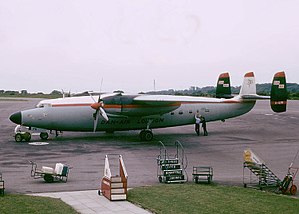| AS.57 Ambassador | |
|---|---|
 Dan-Air Ambassador at Bristol Airport in 1965 | |
| General information | |
| Type | Airliner |
| Manufacturer | Airspeed Ltd |
| Status | Retired |
| Primary user | British European Airways |
| Number built | 23[1] |
| History | |
| Manufactured | 1947–1953 |
| Introduction date | 1951 |
| First flight | 10 July 1947 |
The Airspeed AS.57 Ambassador is a British twin piston-engined airliner that was designed and produced by the British aircraft manufacturer Airspeed Ltd. It was one of the first postwar airliners to be produced.
The Ambassador was developed in response to a requirement identified by the Brabazon Committee for a twin-engined short-to-medium-haul airliner as a replacement for the ubiquitous Douglas DC-3. Airspeed assembled a dispersed design team at Fairmile Manor, Cobham, Surrey, in 1943, which initially worked on a smaller proposal powered by Bristol Hercules radial engines; this was quickly superseded by a larger-capacity design aimed at better fulfilling the expansion in postwar civil air travel, although several entities doubted Airspeed's projected growth in air travel. Fitted with the new but conventional Bristol Centaurus radial engines, the Ambassador was designed to accommodate four Napier Nomad turbo-compound engines, a then-recent innovation. Its fuselage was compatible with pressurisation, this being an optional feature offered to customers.
On 10 July 1947, the first prototype Ambassador conducted its maiden flight at Christchurch with chief test pilot George Errington at the controls; a total of three prototypes were built. Early on, British European Airways (BEA) emerged as a key customer for the type, having placed a £3 million order for 20 aircraft in September 1948. Introducing the Ambassador to service in 1951, BEA often referred to the aircraft as the "Elizabethans", as the aircraft were used for the airline's "Elizabethan Class" passenger service. However, the type was quickly outperformed by the turboprop-powered Vickers Viscount, with BEA opting to withdraw its Ambassadors in 1958.
Secondhand aircraft were operated by several other airlines, including Dan-Air and Northeast Airlines. Despite being produced in relatively small numbers, the Ambassador was operational for longer than had been anticipated by planners.[1]